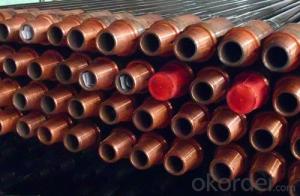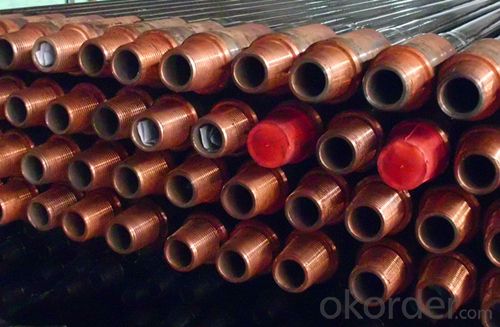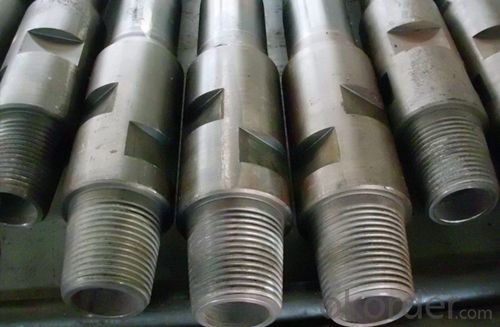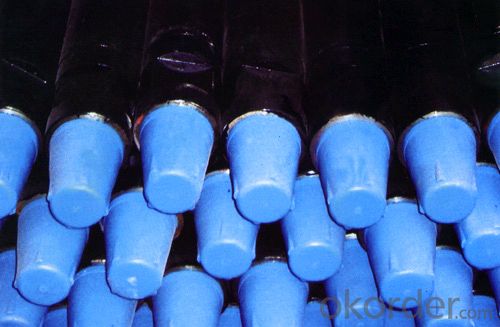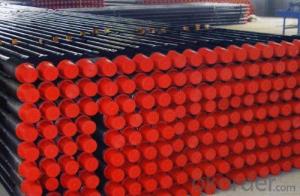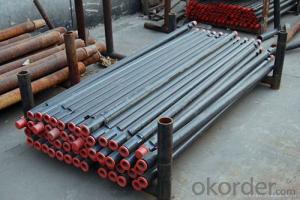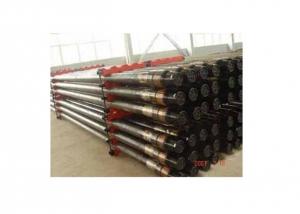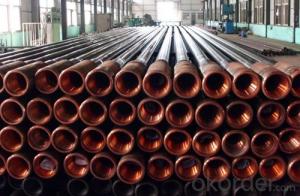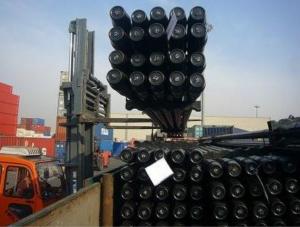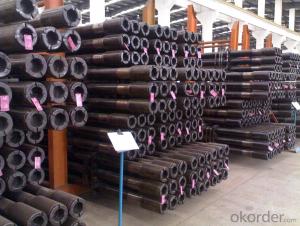Flat Drill Pipe with API Spec 5DP Standard
- Loading Port:
- Tianjin
- Payment Terms:
- TT OR LC
- Min Order Qty:
- 1 m.t.
- Supply Capability:
- 1000 m.t./month
OKorder Service Pledge
OKorder Financial Service
You Might Also Like
1. Structure of Flat Drill Pipe Description
We can supply all kinds of drill pipes that are consistent with API SPEC 5DP. Advanced drill pipe production lines can transfer the welding parameters to the best position to ensure the quality of welding zone; the heat treatment process with the feature of internal and external cooling at the same time can make a more reliable and stable mechanical character. Application of automatic weight, length measurement and automatic spray records can ensure products' traceability. Application of thickening and heating lines and 1250 tons of upsetting machine can ensure the thickening size meet the standard of API SPEC 5DR Using of CN furnace for whole pipe body heating and quenching, tempering machine's advanced heat treatment process can ensure the pipe's mechanical character. Tube hydraulic straightening machine ensures the straightness and coaxiality of pipe body.
The flat drill pipe is mainly applicable for the needs of Hydro-hammer percussive-rotary drilling (liquid and gas), which is featured by such advantages as high rigidity, good airtightness, flat external structure, low rotary torsion and less resistance.
2. Main Features of Flat Drill Pipe
1) Advanced test for quality
2) MTC provided
3) API Standard
3. Flat Drill Pipe Images
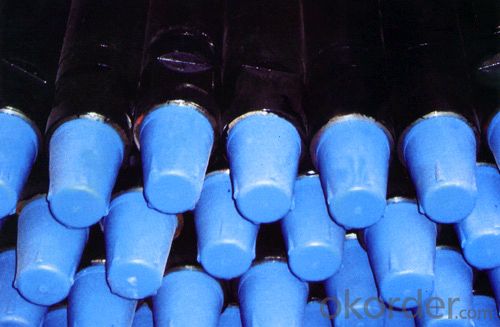
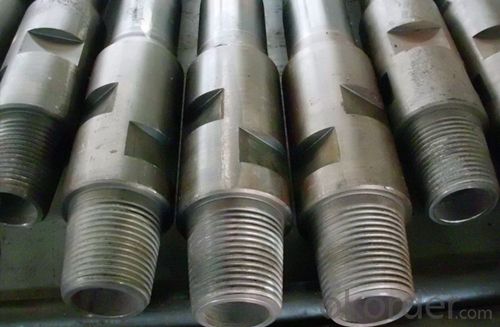
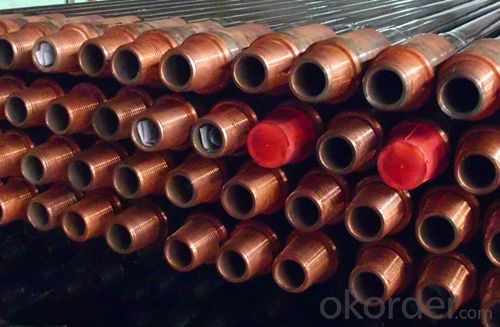
4. Flat Drill Pipe Specification
Main specifications include: Φ73, Φ89, Φ114, Φ127, which also can be customized according to needs, Length 2m-9.5m.
5. FAQ of Flat Drill Pipe
We have organized several common questions for our clients,may help you sincerely:
①How about your company?
One of the leading manufacturers and suppliers specializing in drill pipe products in China, mainly offering drill pipes including oil drill pipe, water well drill pipe, flat drill pipe, geological drill pipe and non-dig drill pipe.
Other than drill pipes we are also capable of supplying a wide variety of pipeline accessories, drill joints, steel pipe fittings, valves etc. consists of our one-stop sales. The integrated sales & service ensures customers with various demands an easier access for purchasing management.
②How to guarantee the quality of the products?
We have established the international advanced quality management system,every link from raw material to final product we have strict quality test;We resolutely put an end to unqualified products flowing into the market. At the same time, we will provide necessary follow-up service assurance.
③How long can we receive the product after purchase?
In the purchase of product within three working days, We will arrange the factory delivery as soon as possible.
- Q: What is the difference between carbon steel pipes and stainless steel pipes?
- The main difference between carbon steel pipes and stainless steel pipes lies in their composition. Carbon steel pipes are primarily made of iron and carbon, while stainless steel pipes contain iron, carbon, and a minimum of 10.5% chromium. This chromium content in stainless steel pipes creates a protective layer of chromium oxide on the surface, making them highly resistant to corrosion. On the other hand, carbon steel pipes are more susceptible to corrosion and require additional coatings or treatments to prevent rusting. Additionally, stainless steel pipes offer better heat resistance and can withstand higher temperatures compared to carbon steel pipes.
- Q: How are steel pipes used in the construction of desalination plants?
- Steel pipes are commonly used in the construction of desalination plants for various purposes. They are used to transport water from the intake point to the plant, as well as to distribute the treated water to the storage tanks or other destinations. Steel pipes are also employed in the plant's infrastructure, such as for the installation of pumps, valves, and other equipment. Additionally, steel pipes are utilized for the discharge of brine, which is the concentrated salt solution generated during the desalination process. Overall, steel pipes play a crucial role in ensuring the efficient and reliable operation of desalination plants.
- Q: What is hot rolled steel pipe? What is a cold drawn steel tube?
- Hot rolling is relative to cold rolling, cold rolling is performed under recrystallization temperature, while hot rolling is rolling above recrystallization temperature.
- Q: What is the average lead time for manufacturing steel pipes?
- The average lead time for manufacturing steel pipes can vary depending on several factors such as the size and complexity of the order, production capacity, and current demand. However, it typically ranges from a few weeks to a few months.
- Q: Is the same specification seamless steel pipe more expensive than welded pipe?
- Specifications of the same kind of seamless steel pipe than welded pipe prices are generally about 30% high, large diameter difference is greater.
- Q: Can steel pipes be used for gas transportation?
- Yes, steel pipes can be used for gas transportation. Steel is a commonly used material for gas pipelines due to its strength, durability, and resistance to corrosion. Steel pipes are able to withstand high pressures and are suitable for transporting both natural gas and propane. They are also capable of withstanding extreme temperatures, making them ideal for gas transportation in various environments. Additionally, steel pipes can be welded together, allowing for a seamless and continuous pipeline system. However, it is important to ensure that the steel pipes used for gas transportation are properly coated and protected against corrosion to prevent any leaks or damage to the pipeline.
- Q: Are steel pipes suitable for underground sewage lines?
- Yes, steel pipes are suitable for underground sewage lines. They are strong, durable, and resistant to corrosion, making them an excellent choice for sewage systems.
- Q: How do you measure the thickness of a steel pipe?
- Different methods can be used to measure the thickness of a steel pipe, depending on the required precision and available tools. Here, we present three commonly used approaches: 1. Calipers or Vernier Calipers: These are widely used and straightforward tools for measuring thickness. Place the jaws of the calipers on both sides of the pipe, ensuring they are perpendicular to the surface. Gently close the jaws until they touch the pipe, and then read the measurement on the caliper scale. 2. Ultrasonic Thickness Gauge: This method provides more accurate results and is commonly employed in industrial settings. An ultrasonic thickness gauge emits high-frequency sound waves that penetrate the steel pipe. By measuring the time it takes for the sound waves to bounce back, the gauge calculates the pipe's thickness. Before taking the measurement, ensure that the pipe surface is clean and smooth. 3. Magnetic Thickness Gauge: This method is specifically designed for measuring the thickness of ferrous materials like steel. The gauge incorporates a small magnet that adheres to the pipe surface. By applying a magnetic field, the gauge determines the distance between the magnet and the base plate. This distance corresponds to the thickness of the steel pipe. It is important to consider that each method has its own limitations in terms of accuracy. The choice of measurement technique should be based on the desired precision, availability of tools, and the specific requirements of the application.
- Q: What is the difference between steel pipe and aluminum pipe?
- The main difference between steel pipe and aluminum pipe lies in their composition and properties. Steel pipe is made primarily of iron and carbon, with other elements added to enhance its strength and durability. It is known for its high tensile strength, resistance to corrosion, and ability to withstand high temperatures and pressure. On the other hand, aluminum pipe is made from aluminum, which is a lightweight metal known for its excellent corrosion resistance, thermal conductivity, and malleability. While steel pipe is generally stronger and more rigid, aluminum pipe is lighter and more easily manipulated. Additionally, steel pipe is often used in applications where strength and durability are critical, such as in construction and plumbing, while aluminum pipe is commonly used in industries that require lightweight materials, such as aerospace and automotive.
- Q: How are steel pipes used in the construction of power plants?
- Steel pipes are widely used in the construction of power plants as they serve multiple purposes. They are primarily used for transporting various fluids, such as water, steam, and fuel, throughout the plant. Steel pipes are also used for the construction of boilers, heat exchangers, and condensers, which are essential components in power generation. Additionally, steel pipes are utilized in the construction of cooling systems, air ventilation systems, and structural supports within power plants. Overall, steel pipes are crucial for the efficient and reliable operation of power plants.
Send your message to us
Flat Drill Pipe with API Spec 5DP Standard
- Loading Port:
- Tianjin
- Payment Terms:
- TT OR LC
- Min Order Qty:
- 1 m.t.
- Supply Capability:
- 1000 m.t./month
OKorder Service Pledge
OKorder Financial Service
Similar products
Hot products
Hot Searches
Related keywords
